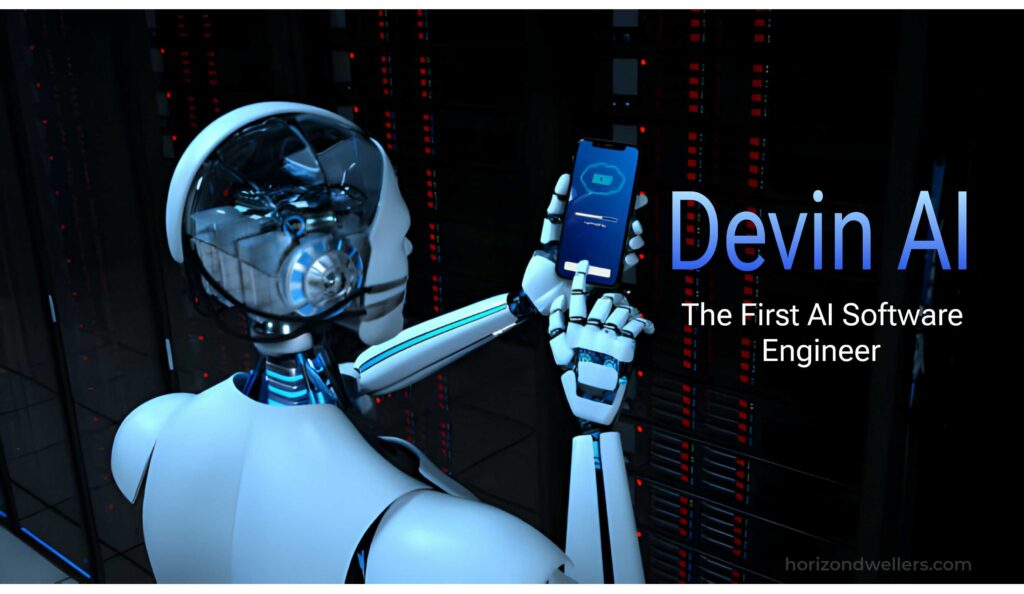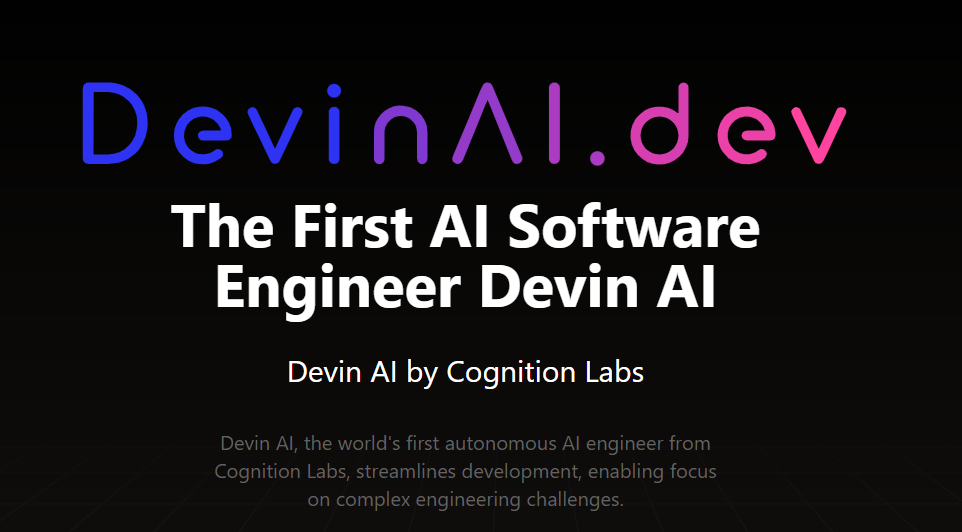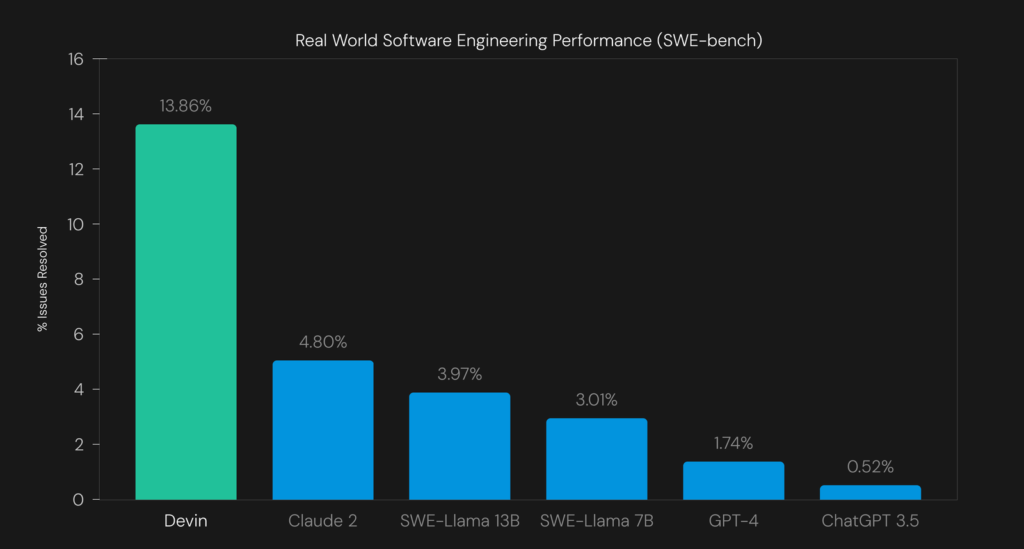In the rapidly evolving landscape of software development, the introduction of Devin by Cognition, an innovative US-based startup, marks a significant leap forward. This groundbreaking, AI-powered software development assistant is poised to transform the traditional approaches to coding, debugging, and deployment, making the process more efficient and intuitive than ever before.
 Pin
Pin Table of Contents
Devin: Revolutionizing Software Development
Devin’s capabilities stretch far beyond those of a conventional programming tool. Unlike other language models like Google’s Gemini or OpenAI’s ChatGPT, Devin stands out for its ability to autonomously manage the complete lifecycle of software application creation. From interpreting simple commands to generating fully functional websites or software programs, Devin streamlines the development process, making it seamless for developers.
 Pin
Pin A Proven Track Record
Devin has already made its mark by completing practical engineering interviews at leading AI companies, and showcasing its prowess on real-world projects through platforms like Upwork. Its impressive performance in the SWE-bench coding benchmark, which consists of over 2,000 software engineering problems derived from real GitHub issues and pull requests from top Python repositories, underscores its effectiveness and reliability as a development tool.
In a significant leap forward for artificial intelligence integration with software development, Cognition recently unveiled Devin, an AI-powered agent designed to revolutionize the workflow of programmers and coders. Devin represents a robust blend of automation and machine learning, equipped with tools and features that streamline the coding process, making the development of applications faster, more efficient, and less prone to errors.
Core Functionalities of Devin
1. Integrated Development Environment: Devin is integrated within a shell, a code editor, and a web browser, which collectively serve as its operating environment. This ensures that it can perform a wide array of tasks without the need for external applications or switching between different tools, hence offering a seamless experience for users.
2. Autonomous Learning via API Documentation: Devin utilizes its web browser to access and comprehend API documentation actively. APIs (Application Programming Interfaces) are crucial for building software and applications as they allow different computer programs to communicate with each other. By reading and interpreting these documents, Devin can autonomously learn how to plug into and use these APIs effectively. This capability significantly reduces the learning curve and time investment required from human developers to integrate and utilize new APIs in their projects.
3. Self-Debugging Capability: One of the standout features of Devin is its ability to self-debug. When encountering an error in the code, Devin doesn’t just stop or send an error message to the user; it proactively adds a debugging print statement to the main code. This action helps in pinpointing the source of the error. Subsequently, Devin reruns the code to verify if the issue has been resolved. This iterative process of self-diagnosis and correction vastly improves the efficiency of the coding and development process, minimizing downtime and frustration for human developers.
4. Versatility and Use Cases: The versatility of Devin is showcased in various use cases demonstrated by Cognition on its YouTube channel. These demonstrations highlight Devin’s ability to not only build and deploy applications but also to identify and rectify bugs within codebases. Furthermore, Devin’s capabilities extend to fine-tuning AI models, indicating its usefulness in a wide range of programming and software development tasks. This versatility underlines Devin’s potential to assist in complex projects, simplify the development process, and enhance productivity.
Devin by Cognition exemplifies the progressive strides being made in the field of artificial intelligence, specifically in its application to software development. By equipping Devin with an integrated development environment, autonomous learning capabilities, self-debugging mechanisms, and demonstrating its versatility across a range of tasks, Cognition is paving the way for a future where AI agents significantly augment the efficiency and effectiveness of human programmers. This heralds a new era of software development, marked by increased collaboration between humans and artificial intelligence, leading to faster innovation and the creation of more sophisticated and robust software solutions.
One of Devin’s standout features is its adeptness at troubleshooting. By incorporating print statements to identify code discrepancies, it not only expedites error resolution but also enables developers to pinpoint issues with precision. Devin’s interactive nature allows it to collaborate with users, absorbing feedback, and providing real-time updates and assistance throughout the development process.
Rapid Learning and Adaptation
Devin’s ability to swiftly assimilate new technologies by scouring online resources and enhancing large language models with insights from research repositories further cements its status as an essential tool for developers. This adaptability ensures that Devin remains at the forefront of technology, ready to tackle the challenges of complex application creation and deployment.
Devin Shatters Records: Revolutionizing Software Development with Unprecedented Performance on SWE-bench
The introduction of Devin, an AI-powered agent developed by Cognition, has been making waves in the software development community, particularly due to its performance on SWE-bench, a benchmarking platform that presents real-world issues derived from open-source projects hosted on GitHub. This platform serves as a rigorous testing ground, designed to assess the capability of AI models in dealing with practical challenges encountered in software development.
 Pin
Pin Image by: devinai.dev
Cognition’s claim that Devin has correctly resolved 13.86% of the issues end-to-end on this platform is noteworthy. To put this achievement into perspective, it’s crucial to compare it with other leading AI models. For instance, the GPT4 AI model, a product of OpenAI’s extensive research, managed to resolve 1.74% of the issues when subjected to the same tests. This was a significant accomplishment in its own right, demonstrating the potential of AI in programming and coding tasks.
However, Devin’s performance not only surpasses GPT4’s achievements by a considerable margin but also outdoes the previous best score held by Anthropic’s AI model, Claude 2, which resolved 4.80% of the issues identified on SWE-bench. This places Devin at the forefront of AI-powered software development tools, showcasing its superior problem-solving capabilities in a real-world setting.
What makes this achievement even more remarkable is that Devin accomplished this feat without assistance in locating the relevant files within the repository. This is a crucial detail, as it implies that Devin’s capabilities aren’t merely confined to resolving coding issues but also extend to autonomous navigation and understanding of complex project structures, which is a common challenge in software development.
This performance is indicative of Devin’s advanced algorithms and learning mechanisms, which likely include an intricate understanding of code semantics, pattern recognition, and possibly an innovative approach to interpreting and acting on API documentation. The ability to autonomously learn from existing documentation and code examples, and to apply this knowledge in practical scenarios, could be a game-changer in how AI impacts software development.
Devin’s success on SWE-bench suggests a significant shift in the landscape of software engineering, where AI agents like Devin can not only augment the work of human developers but also autonomously tackle complex issues that would traditionally require considerable time and expertise. This opens up new possibilities for efficiency, productivity, and innovation in software development projects. Nonetheless, while Devin’s current achievements are impressive, the true potential and broader implications of this AI-powered agent will unfold as it is further refined and adopted within the industry.
Devin vs. GitHub Copilot: Ushering in a New Era of Autonomous AI Development Tools
To understand Devin’s unique position, it’s essential to look at existing AI-powered tools in the software development landscape. Microsoft’s GitHub Copilot stands out as a notable example. GitHub Copilot serves as an AI-powered code completion tool, offering substantial assistance to developers by transforming prompts into runnable codes, completing code segments, and even translating codes across various programming languages. Yet, despite its advanced capabilities, GitHub Copilot operates more as a copilot—hence the name—rather than an autonomous agent. It aids in speeding up the coding process and reducing manual effort but relies on the developer’s guidance to steer the direction of code development. It does not support the completion of projects end-to-end without human intervention.
This is where Devin carves out its niche, setting a new standard in the realm of AI-driven software development tools. Devin surpasses the boundary of mere code suggestions and assistive functionalities. Unlike GitHub Copilot, Devin boasts the remarkable ability to autonomously understand project requirements, generate code end-to-end, and even debug the code without requiring constant human oversight. This level of autonomy and capability showcases Devin as the first of its kind in certain aspects, especially concerning the extent of independence and comprehensive support it offers developers throughout the software development cycle.
For those interested in leveraging Devin’s groundbreaking capabilities, the process to avail of its services has been streamlined for potential users. As of the current stage, Devin is available on an early access basis, targeting individuals and professionals who wish to employ this AI agent for their engineering projects. To gain early access, interested parties are invited to visit the official website of Devin’s developing company and submit a request for access. This process allows the company to manage the demand and ensure that users who could most benefit from Devin’s capabilities are able to do so during this initial phase.
Devin represents not just an advancement in AI-powered coding tools but also a shift towards a more autonomous and efficient approach to software development. As Devin continues to evolve and become more widely available, it may very well redefine the expectations and capabilities of AI in software engineering.
Securing the Future
Backed by Founders Fund, Cognition has not only introduced an innovative solution but has also propelled Devin to the forefront of software development assistants. Given its demonstrated capabilities and unique features, Devin is well-positioned to redefine the norms of software development, offering developers a more efficient, intelligent, and interactive way to bring their creative visions to life.
As we look toward the future, the introduction of Devin by Cognition heralds a new era in software development. With its unmatched ability to oversee the entire application creation process independently, Devin is truly a game-changing solution that promises to elevate the productivity and creativity of developers across the globe.
Frequently Asked Questions (FAQs) About Devin
Devin is an AI-powered agent developed by Cognition, designed to revolutionize the workflow of programmers and coders. It integrates automation and machine learning to streamline the coding process, making development faster, more efficient, and less error-prone. Devin operates in an integrated development environment, autonomously learns from API documentation, self-debugs, and showcases versatility across various programming tasks.
Devin’s integrated development environment encompasses a shell, code editor, and web browser, allowing it to perform a wide array of tasks within a unified platform. This eliminates the need for external applications or switching between tools, offering a seamless experience that boosts productivity and efficiency.
Yes, Devin utilizes its built-in web browser to access, read, and interpret API documentation, enabling it to learn autonomously how to integrate and utilize new APIs effectively. This significantly reduces the learning curve and time investment required from developers to use new APIs in their projects.
When Devin encounters a code error, it proactively adds debugging print statements to the main code to pinpoint the source of the error. After identifying the issue, Devin reruns the code to check if the issue has been resolved. This iterative process of self-diagnosis and correction streamlines debugging, improving overall development efficiency.
Devin demonstrates its versatility through various use cases, such as building and deploying applications, identifying and rectifying bugs, and fine-tuning AI models. Its ability to adapt to different tasks underlines its potential to assist in complex projects, simplify development processes, and enhance productivity across a wide range of programming domains.
Developers interested in utilizing Devin for their software development projects can request early access through Cognition’s official website. This opportunity allows early users to experience Devin’s cutting-edge features and contribute feedback for further enhancements.
Devin sets itself apart by offering a comprehensive suite of features that automate and enhance the coding process beyond simple code suggestion or completion. Its capabilities in autonomous learning, self-debugging, and its integrated development environment push the boundaries of AI integration in software development, making it a pioneering tool in the field.




























